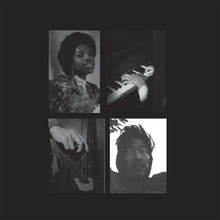Futura Resistenza / Belgium / RE 2024 / Limited Edition, Repress, Stereo, Third Pressing
It was the lonely, overwhelming early days of the pandemic. Topu Lyo was living in Georgia, feeling distant from his home in New York City, and Salenta De Badisdenne was in Wisconsin helping an elderly relative. When Topu sent Salenta the files of Moon Set, Moon Rise, the project of wistful, contemplative cello and piano music they had recorded over the previous two years, she put off listening for a few weeks because of the stress of her daily life. When she finally played the music, she was blown away by what they had created together.
The 17 songs on this album are patient, exploratory, and dynamic. The keys tiptoe through space at some moments, and pirouette ecstatically at others. The cello provides a sonic backbone that glows like amber. With song titles like “Woman Reading a Letter” and “Light Coming On The Plains,” the album evokes vignettes of home, falling asleep with someone you love, learning to soothe yourself.
Topu and Salenta had met in 2018 at a mutual friend’s house in Bed Stuy, Brooklyn and decided to jam together. Their connection was instant: though they weren’t recording with the intention of releasing the music they were making, the very first session they played together made its way onto the album. They continued to meet up and improvise every week until the start of 2020. The two established rituals while recording: Topu would bring dark chocolate to their sessions that they would eat while talking about their days, herbalizing, and eventually playing.
Topu and Salenta made very few edits to the live recordings. The album we hear is a document of their shared bond and their time together. If you listen closely, you can even hear the two artists breathing on the recording. “This music was liberating because both Topu and I were just allowed to be,” Salenta says. “There was no right or wrong way, we were creating this atmosphere together. We were right there with the listener learning about and experiencing it.”
“What I love about Salenta as a human and a musician is how honest she is,” adds Topu. “You hear when we’re playing, suddenly she’ll start laughing. There’s such a human aspect to it that makes me so happy when I listen to the music.”
Both artists, as well as their community of friends and fellow musicians, see the music as healing. Topu and Salenta hope that listeners feel the peacefulness and liberation they experienced while creating these songs.
— Vrinda Jagota




